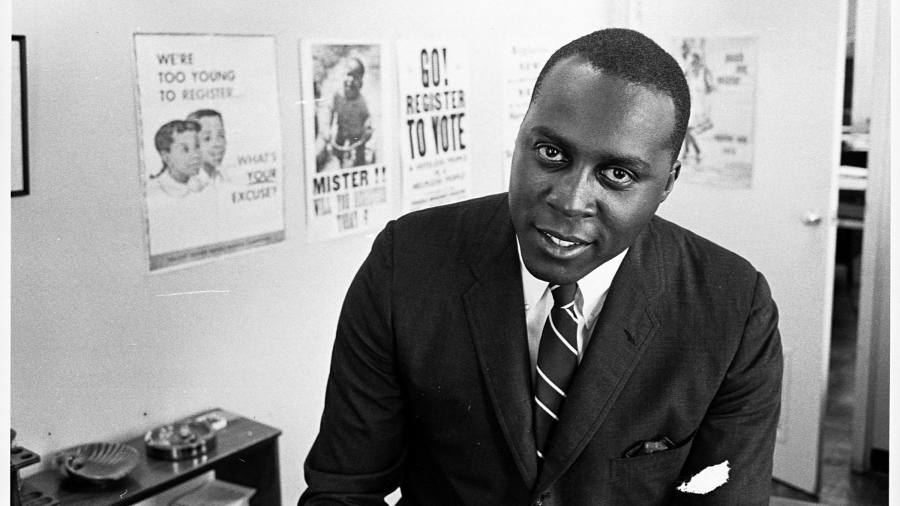[ad_1]
It is a familiar scene. Rumours of a blockbuster deal send investment bankers scrambling. Frantic phone calls ensue as financiers search for the most marginal link to the relevant captain of industry. Yet at the investment bank Lazard, for more than two decades, it was straightforward. Just walk down the hall of the firm’s Manhattan headquarters to the office of Vernon Jordan.
Jordan, who has died aged 85, knew everybody who was anybody in the worlds of US finance and politics. “Wise manâ€, “consigliere†or even “fixer†to the men who ran America, his corporate coterie ranged from Warren Buffett to Rupert Murdoch. His roots in Washington were even deeper, given his close ties to the last four Democratic presidents, and instrumental Republicans too. Educated as a lawyer who late in life became a banker, Jordan’s core skill lay in understanding power and how it was deployed. The savviest of operators, he was also loyal and thus trusted.
That a black man from the Deep South rose to become an ultimate elite insider is an ascent rich in ironies. Born in Atlanta in 1935, in then segregated Georgia, to a postman father, it was his mother and her entrepreneurial energy that was the driving force in his life. It was through her successful catering business that Jordan first saw the wider world. Working as a waiter, he filled the drinks and brought the plates to the white businessmen and lawyers who hired Mary Belle Jordan for their gatherings.
Today, in the wake of Black Lives Matter, nostalgic memories of the civil rights movement can obscure how divided black America was about how best to achieve equality. Jordan, no militant, was always in the camp that championed working within the system.
By 1960, with a wife and baby daughter in tow, he had graduated from Howard University Law School, the elite black college in Washington, and returned to Georgia. There he pursued civil rights, first in the courtroom, then by organising voting registration campaigns across the state. In 1970, he left for New York to helm the United Negro College Fund charity, a post that helped build a broader profile. A big break came in 1971 when he became president of another New York-based group, the National Urban League, a moderate group allied with big business to promote economic empowerment.
The contrast with Martin Luther King, another Atlantan of his generation, is instructive. King criticised capitalism. But for Jordan, hungry to learn about people and arenas he had not encountered growing up, the lure of commerce was irresistible. Corporate boards were thrilled to have him as a token of diversity. He was also tall, well dressed and had a deep baritone voice.
Jordan’s private sector career began in earnest in the 1980s, after he joined the powerhouse DC law firm Akin Gump. At one point, he held as many as 10 different corporate directorships — a collective education as to how the power game was rigged with horse-trading and back-scratching.Â
Politics soon beckoned; naturally, with the Democrats. The party had championed landmark 1960s civil rights legislation. Jordan knew fellow Georgian Jimmy Carter, who had visited Jordan after a 1980 assassination attempt linked to his civil rights work. And it was Bob Strauss, the Akin Gump super lawyer and Democratic operative, who brought him into the firm.
Still, Jordan’s professional interests forced him to acknowledge the other side, especially as the Republican party, traditional bulwark of corporate America, held the presidency through the Reagan and Bush eras. For Jordan, true entrée to the White House came in 1992 with the election of the Oxford-educated, Arkansas governor Bill Clinton. Jordan, as a longtime confidante, became his patron and guide in Washington. They were kindred spirits who bonded over their humble origins in the south and whose ambitions were similarly nurtured by steely mothers.
By the time Barack Obama took office in 2009, the Democratic party was in full thrall to high finance. Jordan told the FT over lunch in 2018, “it is not a crime to be close to Wall Streetâ€. But it had become bad politics, as became clear when Donald Trump rode into office pledging to “drain the swampâ€.
It is poignant that Jordan’s canny and occasional dark art political abilities may mark him down as an anachronism. The same may be true of his talent to bridge divides too. “Vernon kept a light touch even as he was a serious manâ€, says his close friend Peggy Noonan, a conservative writer at the Wall Street Journal and a harsh Clinton critic. “He played it straight and would try to help you even if he disagreed with you.â€
[ad_2]
Source link








